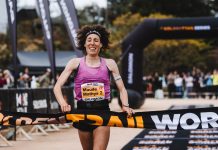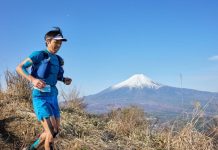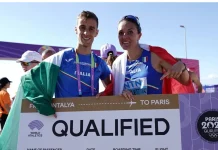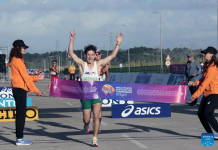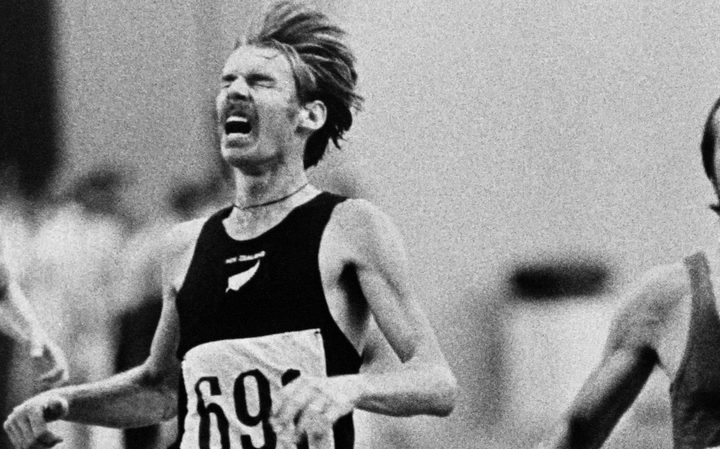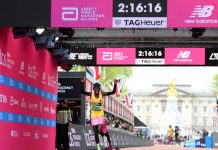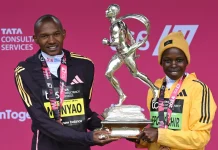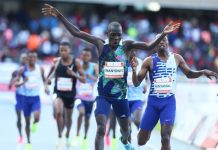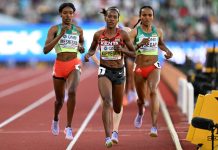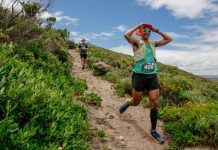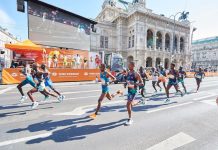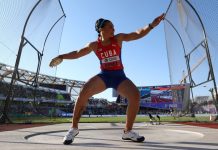Following the recent passing of Dick Quax, we chat to half-a-dozen athletics stars of yesteryear to share their memories of the former world 5000m record holder and 1976 Olympic silver medallist.
Rod Dixon – The 1972 Olympic 1500m bronze medallist and 1983 New York Marathon winner
“I’d heard of Dick Quax for some years and read about his running exploits in Hamilton before watching him win 1500m silver at the 1970 Commonwealth Games in Edinburgh. That race I remember thinking, ‘wow’, he was the only one in the race prepared to chase Kip Keino (the 1968 Olympic 1500m champion). He did not let Keino intimidate him. Dick would not settle for second or third, he was going for the title.
As much as we had (Peter) Snell, (Murray) Halberg, Barry Magee and Mike Ryan in the 1960s, Quax was the athlete who ignited New Zealand’s running success in 1970s.
My first experience of him came, I think, over the mile in 1971 in Wanganui. I was a little intimidated to take on the guy and it wasn’t like today where we have social media, because back then I had no real insight into his personality. When it came to the race he was competitive and he took no prisoners, but off the track he was cordial and polite and over time we developed a close bond, particularly racing on the European circuit together in 1973 and 1974.
I quickly came to admire his determination, single-mindedness and the fact he had an opinion, and he wanted you to respect that. I also found by travelling the international circuit with Dick and John (Walker), he really cared about people and his mates and we would support one another. He told us ‘don’t expect any more than 33 per cent out of me’, and I don’t expect any more out of you and John. We quickly understood this and found a way to work together. No rules needed to be set.
Dick was loved and adored by many. If you didn’t have a ticket to a reception, he’d find a way of getting an invite. He never left you waiting in the wings. He always looked out for John and I.
As an athlete, we used to call him twinkle toes because he used to run so effortlessly on the balls of his feet. I came to Auckland a few times and watched him run five or six laps of a one-mile loop at The Domain – he was flying. He was always very disciplined about his training, very focused and very influenced by his coach, John Davies, who in turn was inspired by the (Arthur) Lydiard principles.
To be a good runner, you need your spiritual, mental, physical and emotional side to be equal and in balance and Dick was very good in this respect. You could sometimes go for a run with him and he’s struggle, but three days later he would run away from you. You could never take one performance as an indication he was either on or off form because he could surprise you.
When the chips were down he could always deliver. I recall when I, Tony Polhill, John Walker and Dick were attempting to set a world 4x1500m record and he immediately said ‘I want to run anchor.’ I knew he had given it more thought than we had, and that day he pulled it out of the bag to run, by far, the fastest leg and help us to that world record (of 14.40.4 in Oslo in 1973).
Personally, it was nice to play a part in probably what was his most memorable moment, setting a world 5000m record in 1977. He had won Olympic 5000m silver and just missed the world record the previous year and we were together in Stockholm. It was then when Dick asked me if I would act as pacemaker through to 3000m in a time of 7:45. I said, I would think about while on a run later that day, I thought, ‘I’m now over the disappointment of Montreal (where Rod finished fourth in the 5000m and Dick won silver) I don’t have any issues with Dick’. I went back to him and said, ‘yes, I will do that for you’.
That day, I hit 3000m in 7:45.3 before one of the Germans took on the pace for a couple of laps before Dick took on a lap. The German then hit the front for lap thinking he would run away from him but, of course, this set Dick up perfectly and the world record (13:12.86) was his.
Back then, as a pacemaker you had to finish the race, and after I jogged down the home straight he thanked me and gave me a heartfelt embrace.”
Dick Tayler – 1974 Commonwealth 10,000m champion
“The first thing I would say about Dick, is he was an exceptional athlete. He was so tough and so hard to beat. If you did occasionally beat him, you knew he would come back the next time and get the better of you. He was always a good mover as an athlete. He was tall with an economical style, ideal for distance runner.
Dick was also such a good guy off the track. He was always very positive with a good sense of humour. You could never knock him back. He was great company and never scared to put his cards on the table.
One of my main memories of Dick is winning the 1500m silver medal at the 1970 Edinburgh Commonwealth Games. It was an incredible race, which was a mark of how good Dick was. He pushed Kip Keino (the 1968 Olympic 1500m champion) all the way and I remember chatting to Kip after the race and he commented how ‘I couldn’t get rid of this guy in the Black Singlet. He scared to crap out of me and he made things very difficult for me’.
I always thought Dick had the capability of one day breaking the world record and I was rapt when he broke the world record (for the 5000m in 1977).
Looking back, Dick was so versatile. He went over to Europe and shook up their best runners and later enjoyed success in half marathons and marathons. I suppose I had my day in the sun (when winning the Commonwealth 10,000m title) but the difference was, when talking about Dick and the likes of Rod Dixon and John Walker, is they enjoyed many years in the heatwave.”
Bryan Rose – 1975 World Cross Country Championships team gold medallist
“I personally have a lot to thank Dick for in terms of my qualification for the 1974 Commonwealth Games. Back then at the national championships, the 10,000m was on the Friday and the 5000m on the Saturday, but I had a bad run in the 10,000m, finishing fourth and missed out on a place in the New Zealand team for the Christchurch Commonwealth Games. The next day I returned to try and qualify for the 5000m, where I had to run a certain qualification time. I recall Dick pulling me through in that race. He kept encouraging me throughout calling out ‘come on Rosey’. I managed to get the qualifying time and put all that down to Dick. I have a lot of time and admiration him both as a person and as an athlete.
He had an incredible repertoire as an athlete. He won a Commonwealth 1500m silver medal, ran a sub-four-mile mile and was a member of the 4×1 mile world record breaking team. He was very adaptable, did a large training load under his coach, John Davies, and was respected throughout the world and was good friends with English distance runners Dave Bedford and Dave Moorcroft.
We built a close connection and lifelong friendship. The last time I spoke with him was a couple of weeks ago at the funeral of former International Cross Country Championships team manager Jim Cunningham. Dick didn’t look too well but he said he was fighting it (the cancer) and to hear of his death came as a terrible shock.
He was always so well respected by his peers and I know he inspired me and countless other runners too.”
Dianne Rodger – Athletics NZ President and two-time former Olympian
“My first memories of Dick was competing at the 1975 World Cross Country Championships in Morocco. Back then, I was just 19 and on my first New Zealand team while he was a rock star of the sport and I was in awe of him.
“To be truthful, during my running career I didn’t know him so well, but in the past five years ago I’ve got to know better as a coach of his son, Theo. It has been fantastic to see his how his passion for the sport has remained and how he has put back to the sport he loved. His interest in young athletes and wanting to get the best out of them has been truly inspiring.”
Dave Moorcroft – Former world 5000m record-holder and 1978 Commonwealth 1500m champion and 1982 Commonwealth 5000m gold medallist
“I first saw Dick when I was 17 years of age. I was in the crowd watching the 1970 Commonwealth Games in Edinburgh. Dick hung on valiantly to the great Kip Keino in the 1500m and won a brilliant silver.
“The last time I saw Dick was back in March at the New Zealand Championships in Hamilton when he was watching his son, Theo, run the junior 1500m. As ever Dick and I shared wonderful memories and those memories were even more poignant because of the gravity of his illness.
What an athlete Dick was. The inspiration us Brits got from watching and racing against Dick, John Walker and Rod Dixon was significant. The Black Singlet and shorts were in themselves intimidating and Dick wore them proudly.
His range from the 1500m to the marathon was exceptional and, of course, his Olympic 5000m silver in Montreal was another standout performance. I will always be particularly proud of sharing the honour with Dick of being a world 5000m record holder. Records come and go but the magical memories of special times shared together last forever. New Zealand has produced many athletics legends and Dick was a true Kiwi legend.”
Adrian Blincoe – New Zealand 5000m record holder and campaign consultant for High Performance Sport New Zealand
“I was a young, developing athlete in the mid to late 1990s when I first became aware of Dick. The 1990s were quite a lean period for New Zealand distance running, so I looked to those guys such as Dick, John Walker and Rod Dixon from the 70s and 80s as my heroes growing up as a young, aspiring athlete.
I first met Dick in his capacity as meet director for the Marley Games. I was aged around 17 or 18 at the time and he was gracious in letting younger athlete compete at an international calibre race.
I didn’t interact with Dick very often until after I graduated from university (in the US) and then on my return to New Zealand our paths would meet and we would have a chat. I recall after he was presenting the prizes at the mile in Wanganui in 2008, I said to him I wanted to break his national 5000m record (of 13.12.86 which was then a world record and which had stood since 1977) that year. I then went on to break the record (with a 13:10.19 in Heusden, Belgium) later in 2008. I then remember as I was sat on the bus returning to the meet hotel getting a text from Dick, thinking, ‘how the hell did he get my UK number’? It was great to receive the message, which showed he supported me from afar and he was proud another New Zealander was running quickly.
We connected more regularly since I moved back to New Zealand, and I’ve been fortunate to hang out with him at some of the Athletics NZ development camps, which his son, Theo, has been involved in. Dick was a great guy to hang out with. He was fun with a great sense of humour, who told it like it is.
Back in the 1970s he revolutionised the sport by winning medals and breaking records along with John Walker and Rod Dixon and deserves to be seen in the same light as those guys. They were brave, prepared to compete anywhere, anytime, and that hard-nosed approach to training, I believe, has left a lasting impression for a whole bunch of Kiwi athletes that have followed.”
Courtesy of Athletics New Zealand



